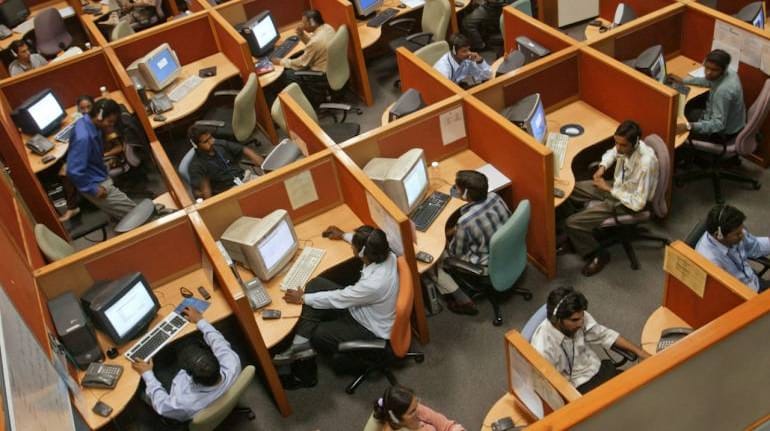



Did you wonder why calls from banks related to loan offers have receded in the past two months?
No, it's not that the banks don't want to do business anymore. But the call centres that place those calls have been out of action due to coronavirus-induced lockdown restrictions.
Call centres have either shut down temporarily or were working with minimal capacity as the demand dropped amidst the lockdown that ensued because of the pandemic. With slump in demand, and supply constraints due to lockdown, these firms are struggling to stay afloat.
Though these firms are slowly limping back to normalcy, call centre executives pointed out that it would take another quarter for business to pick up.
Call centre landscape in IndiaAccording to experts and human resource executives, call centre business in India is pegged at $1 billion and employs over 1 lakh people. These call centres handle both inbound and outbound calls, which include customer support, telemarketing and cold calling.
Cold calling refers to calling customers without having them sign up for it. Telemarketing is direct selling of products and services primarily through phones.
The best example could be the calls you get for credit cards or those calling you to ask for feedback for a particular support a company offered. In terms of business, they are typically B2B services.
Due to the COVID-19 outbreak, these firms have been the worst hit. Pareekh Jain, founder, Pareekh Consulting, said these firms were adversely affected as they lack the infrastructure for making voice calls from home and hence have not been able to function properly.
"Smaller firms are the most impacted since they would have cash flow issues," he said.
Take for instance, this call centre owner from tier 2 city in Tamil Nadu.
"I have done nothing but sleep and eat in the last two months," said Murali, who runs a call centre in Coimbatore. His company offers technical support to retail and logistics clients and employs close to 30 people.
Also Read | Coronavirus impact | French BPO firm Teleperformance terminates 3,000 employees in India
With the demand down due to COVID-19, Murali had to shut down 75 percent of his operations. For instance, if the company made 120 calls per day, it had come down to 20-30. The company is yet to receive customer payment since March.
"My monthly turnover is Rs 15 lakh and about 50 percent account for salaries. Small portion of it goes into maintenance, equipment and rentals," he said. His March turnover was nil.
With no cash flow, he has been paying employees minimal salary and rent out of his pocket.
Another call centre in Bengaluru is in a similar position. The firms offers telemarketing services for e-commerce firms and employs 200 people. The executive of the call centre said the company's business came down by 60 percent.
Track this blog for latest updates on the coronavirus crisis
These firms are facing pricing pressure such as discounts and deferrals in payments as its customers have been adversely impacted. Some of them have discontinued the service and these firms are not in a position to recover the fees since they were not billed.
"Right now, we are discussing with customers about payments terms," said Murali.
Employee concernsWhile companies can now work at 100 percent capacity as per the recent Ministry of External Affairs order, frequency of public transport is limited across India and hence crowded. In Bengaluru, metro is not operational and public transport is yet to resume in Chennai.
Since these employees are dependent on public transport, even with lockdown easing, most of its employees are unable to come of work. Unless public transport is completely restored the supply constraint will continue, he added.
What will change for them post- COVID-19?Given the circumstances, some firms are now looking to automate basic customer support function. Customer support could be classified into three levels, L1, L2 and L3.
In L1 support, the primary function is to guide customer to register a ticket. Since it is a basic customer support, freshers and trainees are mostly employed in this role. For L2, the position requires 2-4 years of experience as they need to do technical and voice support whereas L3 purely technical support.
Executives pointed out that L1 role will be automated and more bots are likely to be deployed. This is hardly new as recent times have seen call centres deploy chat bots for this function. However, the pandemic as accelerated the adoption across.
"The process of automation has been accelerated in many call centres. As a result, the headcount fall has also been accelerated. Though we cannot attribute it to COVID-19 entirely, the fact is that many people would be redundant," said Aditya Narayan Mishra, CEO, CIEL HR Services.
Firms will reskill these employees in L1 to handle more nuanced L2 and L3 roles. However, job losses are inevitable. Mishra pegs that automation is likely to reduce manpower requirement in call centres by 10 percent over the next one year.
Other changes would be inclusion of work from home clause in contracts. The Bengaluru call centre executive said that the company is looking to include 25 percent WFH in the clause. Mishra explained that this move gives cost advantage to companies and also opportunities to people who couldn't work earlier.
Follow our coverage of the coronavirus crisis here
Discover the latest Business News, Sensex, and Nifty updates. Obtain Personal Finance insights, tax queries, and expert opinions on Moneycontrol or download the Moneycontrol App to stay updated!
Find the best of Al News in one place, specially curated for you every weekend.
Stay on top of the latest tech trends and biggest startup news.